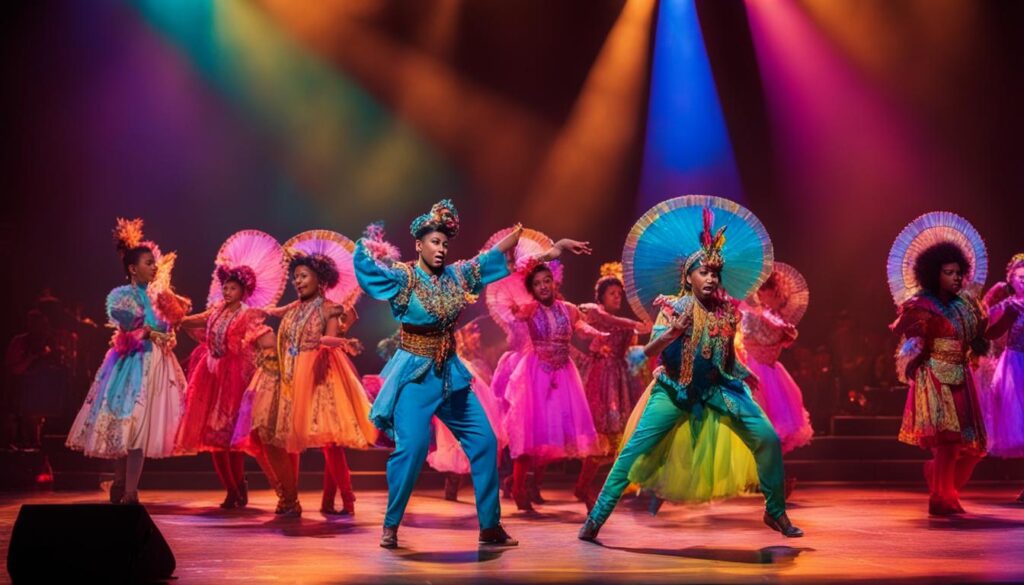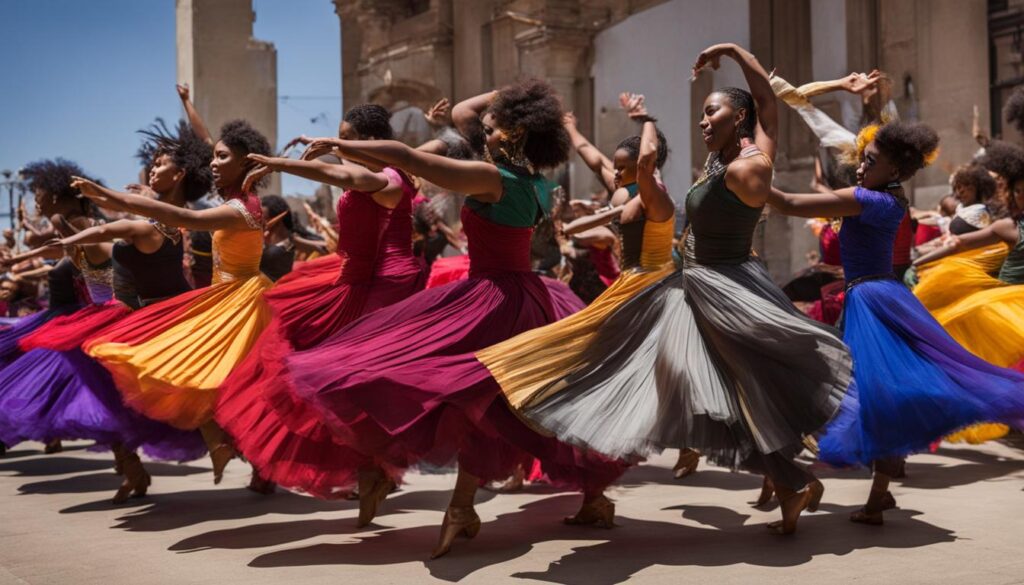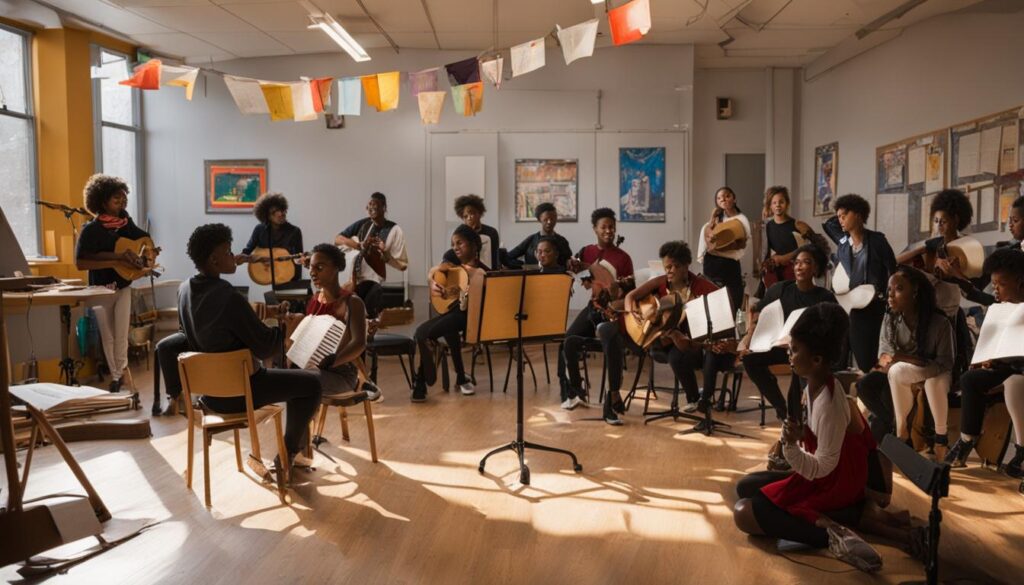Have you ever wondered what a degree in performing arts is called? Well, you’re in the right place! As a professional in the field, I’m here to shed some light on this intriguing topic.
A degree in performing arts is commonly referred to as a Performing Arts Degree. It encompasses the study of various disciplines in the performing arts, including theater, dance, music, and more. The degree focuses on honing the skills and knowledge necessary for a career in the performing arts industry, providing students with a comprehensive education in their chosen art form. Whether pursuing a career as an actor, dancer, musician, or any other performing arts professional, obtaining a degree in performing arts can provide the necessary foundation and training.
Key Takeaways:
- A degree in performing arts is commonly known as a Performing Arts Degree.
- It encompasses the study of theater, dance, music, and other performing arts disciplines.
- Obtaining a degree in performing arts provides a comprehensive education and foundation for a career in the industry.
- Performing arts degrees are beneficial for aspiring actors, dancers, musicians, and other performing arts professionals.
- With a performing arts degree, individuals can pursue various career paths within the industry.
Exploring Performing Arts Education
Performing arts education plays a crucial role in shaping the skills, knowledge, and experience necessary for a successful career in the performing arts industry. Whether aspiring to be an actor, dancer, musician, or any other performing arts professional, pursuing a degree in performing arts can provide a comprehensive education in the chosen art form.
At various educational institutions, such as colleges, universities, conservatories, and specialized performing arts schools, students can enroll in performing arts programs that offer a wide range of courses. These programs typically cover disciplines like acting, dancing, singing, music theory, stagecraft, and theater history. The curriculum is designed to develop students’ artistic abilities, provide practical training opportunities, and equip them with a solid understanding of the business side of the industry.
Performing arts education offers a unique blend of theoretical knowledge and hands-on experience. Students have the chance to work closely with experienced faculty, collaborate with their peers on projects and performances, and participate in productions that showcase their talents. This immersive learning environment allows students to refine their skills, build a portfolio of work, and gain the confidence needed to pursue a career in the performing arts.


The Importance of Performing Arts Curriculum
A well-designed performing arts curriculum is a key component of performing arts education. It provides a structured framework through which students can explore and develop their artistic abilities. A comprehensive curriculum should include a balance of practical and theoretical components, allowing students to gain both technical skills and conceptual knowledge.
By offering a diverse range of courses, a performing arts curriculum ensures that students receive a well-rounded education. It exposes them to different styles, techniques, and traditions, fostering creativity and broadening their artistic perspectives. Additionally, a comprehensive curriculum helps students develop critical thinking, problem-solving, and communication skills – all of which are essential in the performing arts industry.
In conclusion, performing arts education offers aspiring artists the opportunity to receive professional training, develop their artistic abilities, and gain a deeper understanding of the performing arts industry. It equips students with the skills and knowledge necessary to pursue a career in their chosen discipline, while also fostering creativity, collaboration, and personal growth. Whether studying theater, dance, music, or any other performing arts, a performing arts education provides a solid foundation for a successful career in the dynamic world of the performing arts.
The Path to Becoming a Performing Arts Major
To embark on the journey of becoming a performing arts major, aspiring students must first gain admission to a performing arts college or school that offers a program in their chosen discipline. These specialized institutions have specific requirements for admission, which often include auditions, portfolio submissions, interviews, or academic qualifications. The selection process is rigorous, but it ensures that students who are admitted have the dedication, talent, and potential to excel in their chosen field.
Once accepted into a performing arts college or school, students have the opportunity to immerse themselves in their chosen discipline. They can major in a specific area, such as theater, dance, music, or a combination thereof, tailoring their education to align with their passion and career goals. The curriculum for a performing arts major varies depending on the institution and the chosen discipline, but it typically includes a blend of practical classes, theory-based courses, and performance opportunities.
Working closely with experienced faculty, performing arts majors engage in intensive training and exploration of their craft. They participate in acting workshops, dance rehearsals, vocal coaching, music ensemble performances, or any other relevant activities. These immersive experiences foster creativity, develop technical skills, and cultivate a deep understanding of the art form. Students often collaborate with their peers on various projects, allowing for a diverse range of artistic perspectives and collective growth.


Throughout their academic journey, performing arts majors have the chance to showcase their talents through live performances and productions. This invaluable stage experience not only allows them to refine their skills but also builds confidence and provides a platform for industry exposure. By engaging with audiences and receiving feedback, students gain a genuine understanding of the demands and rewards of a career in the performing arts.
Table: Comparison of Performing Arts College Programs
| Performing Arts College | Location | Disciplines Offered | Admission Requirements | Notable Alumni |
|---|---|---|---|---|
| New York School of Performing Arts | New York City, NY | Theater, Dance, Music | Audition, Portfolio Submission, Interview | Jennifer Aniston, Robert De Niro |
| London Academy of Music and Dramatic Art | London, UK | Theater, Film, Television | Audition, Academic Qualifications | Benedict Cumberbatch, David Oyelowo |
| Juilliard School | New York City, NY | Drama, Dance, Music | Audition, Academic Qualifications | Viola Davis, Kevin Spacey |
Choosing the right performing arts college or school is a crucial step in the path to becoming a performing arts major. Each institution offers a unique blend of educational approaches, faculty expertise, and industry connections. By carefully researching and evaluating options, aspiring performers can find the ideal environment to nurture their talents, expand their knowledge, and embark on a fulfilling career in the performing arts.
The Benefits of Pursuing a Degree in Performing Arts
Pursuing a degree in performing arts offers numerous benefits for individuals passionate about the arts and seeking a career in the industry. Firstly, it provides a structured educational experience that allows students to develop their artistic skills and knowledge under the guidance of experienced professionals. It offers opportunities for practical training, performances, and collaborations with peers, helping students build their portfolios and gain real-world experience. Additionally, a degree in performing arts can open doors to various career paths within the industry, including acting, dancing, directing, choreographing, teaching, and arts administration.


Furthermore, pursuing a degree in performing arts equips students with a comprehensive understanding of the industry and its various aspects. Through coursework in performing arts studies, students explore the history, theory, and techniques of their chosen art form. They gain insights into the cultural significance of performing arts, the development of different styles and genres, and the evolution of performance practices over time. This broad knowledge base not only enhances their artistic abilities but also provides them with a deeper appreciation for the art they create.
“A degree in performing arts can provide aspiring artists with the necessary foundation and professional training to succeed in a competitive industry.”
Lastly, the networking opportunities and connections made during a performing arts degree program can be valuable in establishing a career in the industry. Students have the chance to collaborate with fellow performers, work with established artists and instructors, and participate in industry events and showcases. These connections can lead to future collaborations, job opportunities, and mentorship, helping students launch their careers in the performing arts.
The Power of Practical Experience
One of the most significant advantages of pursuing a degree in performing arts is the emphasis on practical experience. Many programs have performance-based requirements, such as participating in productions, showcases, or recitals. These opportunities allow students to apply what they have learned in the classroom and gain valuable stage experience. Through these performances, students develop their performance skills, learn to work in a team, and refine their artistic voice. They also have the chance to receive feedback from experienced professionals, which is crucial for growth and improvement as an artist.
| Benefits of Pursuing a Degree in Performing Arts |
|---|
| Structured education and training under experienced professionals |
| Opportunities for practical training, performances, and collaborations |
| Gateway to various career paths in the industry |
| Comprehensive understanding of the industry and its history |
| Networking opportunities and connections for future career prospects |
In conclusion, pursuing a degree in performing arts can provide aspiring artists with the necessary foundation and professional training to succeed in a competitive industry. It offers a structured educational experience, practical training opportunities, and a comprehensive understanding of the performing arts. Additionally, it opens doors to various career paths and provides valuable networking connections. Whether you have a passion for acting, dance, music, or any other performing arts discipline, a degree in performing arts can be the gateway to realizing your artistic ambitions.
Conclusion
A performing arts degree is a gateway to a fulfilling career in the vibrant world of entertainment. Whether it’s theater, dance, music, or any other performing arts discipline, this comprehensive program equips students with the necessary skills, knowledge, and experience to thrive in the industry.
By pursuing a performing arts education, students are exposed to a structured curriculum that balances theory and practice. This includes practical training, performance opportunities, and collaborations with peers and experienced faculty. It’s a chance for aspiring performers to develop their artistic abilities and build a robust portfolio.
With a performing arts degree in hand, graduates can explore various career paths within the industry. From acting and dancing to directing, choreographing, teaching, and arts administration, the possibilities are endless. The degree also serves as a strong foundation for further education, paving the way for postgraduate studies in performing arts.
Moreover, the networking opportunities provided during a performing arts program can prove invaluable in establishing a successful career. Building connections with industry professionals and fellow artists opens doors to exciting collaborations and future prospects.
FAQ
What is a degree in performing arts called?
A degree in performing arts is commonly referred to as a Performing Arts Degree.
What is included in a performing arts education program?
A performing arts education program includes courses in acting, dancing, singing, music theory, stagecraft, and theater history, among other relevant subjects.
How do I become a performing arts major?
To become a performing arts major, you must first apply and be accepted into a performing arts college or school that offers a performing arts program. These institutions typically have specific requirements for admission, including auditions, portfolio submissions, interviews, or academic qualifications.
What are the benefits of pursuing a degree in performing arts?
Pursuing a degree in performing arts provides a structured educational experience, opportunities for practical training and performance, and potential career paths in acting, dancing, directing, choreographing, teaching, and arts administration. It also offers a strong foundation for further education and valuable networking opportunities.

